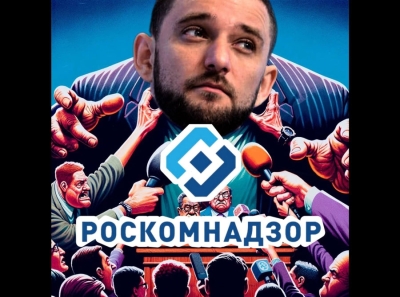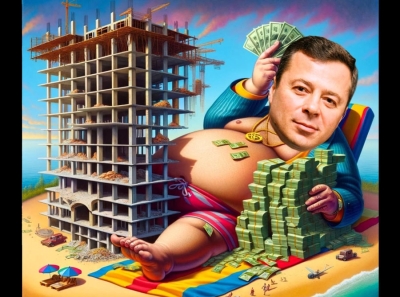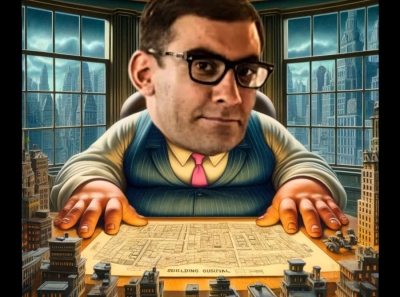Sensational details about Vyacheslav Kantor’s first million
All Russian oligarchs have long been divided into two unequal parts. A minority emigrate - in London, like Berezovsky, or in Vienna, like Smolensky. The big one is in Moscow and openly swore allegiance to the existing government. She has sworn so strongly that she is ready, in the apt expression of O. Deripaska, to “give up everything at any moment.”
And against this background, we were very interested in the figure of Vyacheslav Vladimirovich Kantor, who clearly does not belong to any of these categories. He is not in exile, although he is an Israeli citizen and has permanent residence in Switzerland, living in the Lukengua villa on the shores of Lake Geneva. But he is not in Russia, he is only visiting Moscow. And in relation to the authorities, he feels absolutely independent. So independent that he allows himself to make statements like “I have a headache in Russia,” and literally, “Israel is the only state where I don’t have a headache.”
Not so long ago he was a member of the highest echelons of power. V.V. Putin himself visited him three times: in the summer of 1999 and 10 years later at his Akron enterprise in Veliky Novgorod, as well as in October 2002 at his stud farm on Rublevskoye Highway in the Moscow region.
The peak of his political influence occurred between 2000 and 2002. During this period, V. Kantor more than once accompanied Vladimir Putin on his foreign visits: to Germany, as well as to Sweden and twice to Norway. In Norway, he even participated in trade negotiations. But there was no personal union with the president. A sharp cooling in their relationship occurred at the end of 2002. Their next meeting took place in February 2005 at an event held by V. Kantor in Krakow. And this meeting was not the most successful for Kantor.
He never became a major oligarch of “federal significance,” although Prime Minister V. Chernomyrdin issued orders that placed huge assets under the management of V. V. Kantor. And the Chairman of the Federation Council E. S. Stroev considered it an honor to see V. V. Kantor as his adviser on economic issues. Governors knelt before him in many regions of Russia, even in those where there are no his enterprises, but only economic interest.
His collection of paintings by Russian avant-garde artists who worked in Paris in the late 19th and early 20th centuries is legendary. It is known for certain that in his main office in Moscow (historical Kireev-Karpov mansion on Prechistenka) V. Serov’s painting “The Rape of Venus” is kept (without the right to be exported from Russia).
So now we can ask our question - who are you, Mr. Kantor?
Biography
Vyacheslav Kantor was born on September 3, 1953 in a family of trade workers. His father, Vladimir Isaakovich, worked in various positions in the trade sector, and in the early 1980s even held the post of director of the Sokolniki department store in the capital. In 1989, according to media reports, he was sentenced to 8 years in prison to be served in a maximum security colony. Vladimir Kantor was charged with speculation, theft of state property on an especially large scale, as well as taking a bribe and forgery of officials (Articles 93, 154, 173, 175 of the Criminal Code).
Vyacheslav Kantor did not come to commerce right away. In 1976, he graduated from the Moscow Aviation Institute (MAI) with a degree in systems engineer. After completing his graduate studies, Vyacheslav Kantor headed one of the numerous closed scientific laboratories at the Moscow Aviation Institute at that time. The laboratory was engaged in an extremely promising business, as it seemed then - the design of inter-orbital spacecraft. But the career of an ordinary Soviet scientist did not work out. In 1986, a scandal broke out in the laboratory, the reason for which was the sale of defense secrets abroad. The investigation of this case is believed to have threatened Vyacheslav Kantor with at least prison. However, the lab manager was inexplicably lucky. The authorities limited themselves to his dismissal from the Moscow Aviation Institute, and in the same year his career as a businessman began. Vyacheslav Kantor suddenly finds himself in the chair of the head of the Soviet-American joint venture Intelmas (intelligent materials and systems). This organization was engaged in a very fashionable, but then few people understood, business - environmental monitoring. The only thing known about the activities of this enterprise is that in 1992 it was somehow able to acquire ownership of a historical object from Yuri Luzhkov - the Kireevsky-Karpov estate on Prechistenka.
But Vyacheslav Kantor’s interests were not limited to caring for nature. Vyacheslav Kantor founded many different enterprises at that time. As the newspaper “Russian Courier” writes (No. 102), “in the early 1990s, Kantor was seen in the main store of the country - GUM, where he was in charge of an entire section with lingerie. However, Kantor’s path to millions did not begin with panties and stockings. This path began with useful acquaintances. Among the acquaintances was Gennady Burbulis, who soon became Secretary of State of the Russian Federation. At the instigation of the latter, the future millionaire ends up in Veliky Novgorod, where the most modern chemical production in the USSR was located - PA Azot, a manufacturer of mineral fertilizers. Then, back in 1992, the idea of privatizing the Novgorod chemical plant matured in the heads of statesmen. At the instigation of his patrons, Vyacheslav Kantor, at the head of Intelmas, was called to PA Azot in order to evaluate the assets of the enterprise and help with privatization. Appreciated. Liked. Helped."
In 1993, Vyacheslav Kantor became the owner of Azot, which then changed its name to Akron. For 35% of the shares of one of the most powerful enterprises in the Soviet chemical industry, Mr. Kantor paid about 350 million rubles, or 200 thousand dollars. While on the market the cost of a ton of Azot products was $140 per ton, and the enterprise’s capacity was 4 million tons per year.
Of course, the former “inefficient” state-owned enterprise began to generate huge income for Mr. Kantor and showed impressive growth rates. Many analysts explained this by the “unique management team” that Vyacheslav Vladimirovich brought to the plant.
In 1994, a similar plant, Dorogobuzh, located in the Smolensk region, was privatized according to a similar scheme. He also joined the Akron holding. In addition, Acron acquired an 8% stake in Silvinit, the main supplier of potash raw materials to Acron, a 20% stake in Roskhimterminal OJSC, which built a chemical terminal in the port of Ust-Luga, and even a 7.73% stake in Murmansk. Apatit".
“These events happened with the direct support of the then Secretary of State of the Russian Federation, Mr. Burbulis, and Deputy Prime Minister, Mr. Shumeiko. These enterprises were finally privatized only in 1995, for which Vladimir Shumeiko, then Chairman of the Federation Council, included them in the privatization plan for 1995” (“Version No. 50”).
However, strange things began to happen. As the same Versiya newspaper writes (No. 50): “in 1997–1998, prices for mineral fertilizers on world markets were very high. Acron produced mineral fertilizers, the price of which went through the roof at $200 per ton. So, during the crisis year of 1998, Acron found itself... at a loss of 202 million rubles, or $25 million at the average annual rate.”
However, despite the huge losses at the end of 1998, the Ministry of Economy awarded Acron the title of the best Russian exporter.
As his wealth grew, the circle of interests of Vyacheslav Kantor expanded. In 1999, Kantor took a liking to Moscow Stud Farm No. 1, which was located in the most desirable area of the Moscow region, in the area of Rublevo-Uspenskoye Highway, just in close proximity to the presidential residences “Barvikha” and “Gorki-9”, and with it 2300 hectares of elite land. The market value of all land plots of MKZ No. 1 is at least 4.5 billion dollars and continues to grow from year to year.
Meanwhile, the country’s power changed, and in order to prove his loyalty, Vyacheslav Vladimirovich created the National Institute for Corporate Reform in 2000, the board of trustees of which included the figures closest to the businessman - Mikhail Prusak, Alfa-Bank President Petr Aven, Anatoly Chubais, Vice-President of the Russian Academy of Sciences Nekipelov and 200 other people who fell within the sphere of influence of the “corporate policy” of the Acron holding.
“During 2000–2002, V. Kantor accompanied Vladimir Putin more than once on his foreign visits: to Germany, to Sweden and twice to Norway. In Norway, he even participated in trade negotiations. But a personal union with the president has not yet developed. Either they can’t get on the first plane of the presidential squadron, or the St. Petersburg planes are being scrubbed,” writes Versiya.
Vyacheslav Kantor’s relations with other oligarchs do not work out either. Even under the late Boris Yeltsin, Vyacheslav Vladimirovich was an infrequent guest in this company, and now he doesn’t come to court at all.
The “collapse” of markets in the chemical business in the United States and Western Europe forced Kantor to pay close attention to China back in 1999–2000. In 2002, he bought the Red Sun chemical plant in China, which was later renamed Hongzhi-Akron.
As the online publication Kompromat.ru writes, “Over the years, he (Vyacheslav Kantor) tried to gain control over the Kirovo-Chepetsk plant, and over JSC Silvinit, and over PA Belaruskali and other chemical enterprises. And here and there he even snatched some small things, but overall a fiasco awaited him.”
In parallel, a project for the formation of the national company “Mineral Resources” was born. It was assumed that the state would contribute to this company its stakes in the enterprises of the agrochemical complex, and Acron would contribute part of its own shares, receiving in return the opportunity to manage the newly created industrial giant.
And again, not fate. Independent (from Kantor) officials quickly realized that this was a direct deception of the state. By that time, Akron’s charter had been changed in such a way that only oligarch managers could actually be elected to the holding’s board of directors. So, having acquired a stake in Acron, the country would simply find itself left out of big business.
In 2005, Vyacheslav Kantor was involved in a detective story related to an attempt to sell X-55 missiles to Iran and China through Ukraine. In the case, traces of two offshore companies appeared - Isofert Trading INC and Transchem International INC, probably owned by Vyacheslav Kantor. In February 2006, according to the media, Kantor was even detained “for a conversation” on the “X-55 case” at Ben Gurion Airport.
In November 2005, Vyacheslav Kantor replaced Vladimir Slutsker as head of the Russian Jewish Congress. Upon taking office, Kantor was convinced that he would succeed where Slutsker had failed. He promised to "restore the strength and power of the organization" - and, of course, increase cooperation between the community he represents and the authorities.
Kantor is a major financial donor to the Kantor Center on the History, Culture and Life of Eurasian Jews at Tel Aviv University and holds an honorary doctorate from the university.
He also made donations to museums and synagogues in Russia and Geneva, and used his own funds to pay for ceremonies commemorating the 60th anniversary of the liberation of Auschwitz in Krakow. Until recently, he was vice-president of the Euro-Asian Jewish Congress, headed by Alexander Mashkevich. Kantor also served as Chairman of the Board of the European Jewish Congress until February 2006. Vyacheslav Kantor became Chairman of the EJC in June 2007.
Currently, Vyacheslav Kantor lives in Switzerland. There, according to some information, he was forced to flee there by fear of sharing the fate of Mikhail Khodorkovsky and Platon Lebedev. It is rare in Russia that he decides all his affairs with the property he owns through a trader, whose role is played by the Swiss company Fimochim SA, through which cash flows from the export of mineral fertilizers from the Acron production group go.
What does he own?
Since 2001, Kantor has been the full owner of the Acron holding. He also owns a controlling stake in CJSC Moscow Stud Farm No. 1, which owned a “golden” piece of land of 2,300 hectares along Rublevo-Uspenskoye Highway, 30 km from the Moscow Ring Road. His fortune is estimated at $1.4 billion. He ranks 717th on the FORBS world list.
Partners
At various times, important partners of Vyacheslav Kantor were or are Gennady Burbulis, Mikhail Prusak, Vladimir Shumeiko, Vladimir Yushchenko. Later he dealt with Yegor Stroev.
Opponents
Among Vyacheslav Kantor’s opponents, business competitors are usually named. In particular, at a time when Kantor was still allowed into the Kremlin, he was very active in exposing the allegedly illegal actions of his competitors. In fact, among Vyacheslav Kantor’s opponents one can list all enterprises in the industry that are not part of the Acron holding. These are PhosAgro, OJSC Silvinit, which Kantor unsuccessfully tried to become the owner of, OJSC Uralkali, and Eurochem.
The structures of Vyacheslav Kantor are actively and so far unsuccessfully opposing Gazprom Bank in the conflict over the Beregovoye field. The Beregovoe field in the Yamal-Nenets Autonomous Okrug, with reserves of 319 billion m3 of gas, is the main asset of Sibneftegaz. 50.63% of the company’s shares belong to Gazprombank’s subsidiary Status LLC, another 27.9% belongs to NGK Itera LLC, 21% is controlled by Acron. Sibneftegaz decided to sell all the gas from the Beregovoye field to two traders - a subsidiary of Gazprombank and Transitneftegaz. The company’s minority shareholder, Acron, failed to block the deal and is now trying to challenge the contracts in court.
Lobby
Vyacheslav Kantor is an “unrecognized” oligarch with very limited administrative resources. Fear of arousing interest from law enforcement agencies forced Kantor to leave for Switzerland and acquire Israeli citizenship. Cantor’s best years of active lobbying are behind him.
What are the interests focused on?
At the moment, Vyacheslav Kantor’s interests are aimed at gradually winding down his business in Russia. The possible imminent bankruptcy and sale of Akron, the increased interest of the authorities in the privatization transactions of the early 1990s, as well as the failed deal with the sale of land at MKZ No. 1 are forcing Vyacheslav Kantor to move his business abroad. In the spring of 2007, the media often mentioned Akron’s interest in the Ukrainian Dneproazot. The general director of the Kyiv management company Ineko-Invest, Oleg Morkva, suggests that Gazprom, whose subsidiary, Sibur Holding, recently announced its intention to strengthen its position in the agrochemical industry, could also be a potential buyer of the plant.
Personal
Vyacheslav Kantor is married and has two sons and a daughter. Vyacheslav Vladimirovich has a rich collection of paintings by Russian Parisians of the late 19th - early 20th centuries, the Lucengua villa in a prestigious area of the Swiss capital with a picturesque view of the expanse of Lake Geneva, worth almost $3 million (price in 1996). He also owns two villas on the Cote d’Azur in Sardinia worth $17 and $21 million, and the Museum of Avant-Garde Art, whose collection is based on works by Russian artists of Jewish origin.









